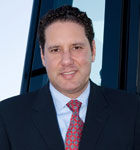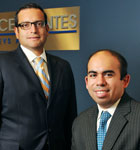
Private practice gave me a good overview and a global perspective of the legal process in general. As a private practitioner, I tried to limit costs and expenses for my clients, and at the same time, give [them] the best outcome possible. It’s the same in the corporate-law setting. We’re on a limited budget. That requires me to allocate resources based on what I determine the company’s legal priorities to be.
I like solving problems—I think that’s what the legal profession allows me to do. I like to think of creative solutions based on my foundation of legal expertise to formulate solutions to problems that arise, whether that involves litigation or everyday contract negotiations.
Being a corporate lawyer, I no longer have to worry about billable hours. That’s nice. And I don’t have multiple clients. All my clients are in-house and there is no to need to market my legal skills to the broader public. That would be one of the best aspects. As a result, I tend to have a better work-life balance than I had as a private lawyer, and can spend more time with my family—my wife and two young sons.
There’s always a point in litigation where reasonableness can prevail, but you have to be aware of what your goals are, otherwise, one or both of the parties might determine that the dispute has become too expensive to resolve without winning a jury award. There’s a limited window where you can resolve a claim in litigation efficiently and make it a win-win situation. Once you get past that point, it’s either a win-lose or a lose-lose for both parties.
For young Latinos who want to go into law, it’s not enough just to be bilingual. They also have to know all the important legal terms in both languages and be aware of the sometimes subtle and sometimes profound cultural differences between Spanish-speaking countries. So, I would urge them to continue to become proficient in being bilingual in legal terminology and not to assume that a legal term or any other bilingual word carries the same meaning across borders.
In the legal profession, we have an obligation to reach out to college students and law students to make sure they are aware of the many opportunities out there for them. Law professionals should volunteer to speak at Latino organizations. I’ve spoken at my alma mater, University of Houston Law Center. I’ve also been invited to attend different professional expos where I have a table and speak about what I do. Students are always appreciative of such efforts, and maybe you’ll touch someone in a way that will help guide their career and life.
I would also encourage students to reach out to their college Hispanic professional organizations and law associations, as well as to go beyond the law school to other professional organizations for networking. Some legal professional organizations will give membership discounts to students, or even waive the fee if they stay on after they pass the bar.
The Association of Corporate Counsel, a national organization that serves professional legal counsel, holds seminars monthly, mostly presented by law firms, which I find very helpful. At Abogados Corporativos, a subgroup, attorneys get together to discuss legal matters involving Latin American divisions of international companies. It’s all voluntary. I use it as a networking tool to meet other people in the legal profession and to reconnect with old friends.

